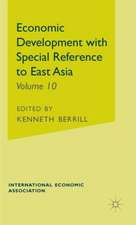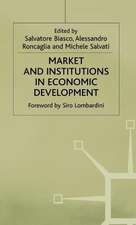The Successes and Failures of Economic Transition: The European Experience
Autor H. Gabrisch, J. Hölscheren Limba Engleză Hardback – 25 aug 2006
| Toate formatele și edițiile | Preț | Express |
|---|---|---|
| Paperback (1) | 634.00 lei 6-8 săpt. | |
| Palgrave Macmillan UK – 2006 | 634.00 lei 6-8 săpt. | |
| Hardback (1) | 638.43 lei 6-8 săpt. | |
| Palgrave Macmillan UK – 25 aug 2006 | 638.43 lei 6-8 săpt. |
Preț: 638.43 lei
Preț vechi: 751.10 lei
-15% Nou
Puncte Express: 958
Preț estimativ în valută:
122.20€ • 132.78$ • 102.72£
122.20€ • 132.78$ • 102.72£
Carte tipărită la comandă
Livrare economică 22 aprilie-06 mai
Preluare comenzi: 021 569.72.76
Specificații
ISBN-13: 9781403934932
ISBN-10: 1403934932
Pagini: 187
Ilustrații: XIV, 187 p.
Dimensiuni: 140 x 216 x 16 mm
Greutate: 0.36 kg
Ediția:2006
Editura: Palgrave Macmillan UK
Colecția Palgrave Macmillan
Locul publicării:London, United Kingdom
ISBN-10: 1403934932
Pagini: 187
Ilustrații: XIV, 187 p.
Dimensiuni: 140 x 216 x 16 mm
Greutate: 0.36 kg
Ediția:2006
Editura: Palgrave Macmillan UK
Colecția Palgrave Macmillan
Locul publicării:London, United Kingdom
Cuprins
List of Figures List of Tables List of Boxes List of Acronyms Acknowledgements Introduction PART 1: THE MEANING AND MEASUREMENT OF TRANSITION What Transition Means How Transition is Measured An Alternative Measure: Economic and Social Effects Appendix A: The Gini Coefficient and the Lorenz Curve PART 2: TWO COMPETING CONCEPTS OF TRANSITION The 'Washington Consensus' Approach The Evolutionary-institutionalist Approach Fundamental Differences in Transitional Issues The Dispute over Stabilization Policy A Country Taxonomy of Transition Appendix 1: The Lipton-Sachs Model of Combining Liberalization and Stabilization Appendix 2: IMF Financial Programming PART 3: FINANCIAL INSTITUTIONS, STABILITY, AND GROWTH The Core of the Monetary Economy: The Central Bank Financial Systems as Stabilizers Financial Fragility The Relevance of Financial Systems for Stability and Growth The Strategy of ' Semi -liberalization' The Evolution of Financial Institutions PART 4: PRIVATIZATION AND COMPETITION From State to Private Ownership A Taxonomy of Privatization Methods A Review of Anti-trust Practices in EU Accession Countries PART 5: EMERGING LABOUR MARKETS Supply- and Demand-side Liberalization The Unemployment Problem The Optimal Speed of Transition The Beveridge Curve Growth and Unemployment Appendix: The Aghion-Blanchard Model of the OST PART 6: OPENING TOWARDS THE WORLD The Open and Opening Economy Price Convergence and Aggregate Demand Relative Price Shocks and Value Added The Exchange Rate as a Tool for Trade Policy Capital Account Liberalization Appendix: Trade Opening and Negative Value Added PART 7: RISING INCOME INEQUALITY Income Distribution and Convergence in the Transition Process The 'Standard Explanation' for Rising Inequality and its Application to Transition Economies Macroeconomic Aspects of Income Distribution Some Observations Cross-country Comparisons Country Performances Reconsidered Convergence versus Divergence Appendix: Income Statistics PART 8: TRANSITION AND EUMEMBERSHIP Competition Policy EMU Membership Fiscal Transparency Fiscal Transparency and Rules in poland PART 9: COUNTRY CASE STUDIES East Germany: The Transfer Economy Hungary: The Economy of Stop-go Cycles Russia: The Oligarchic Economy The 'new rich' and Capital Flight China: Currency Undervaluation and Economic Development Reasons for Fixing the Exchange Rate to the US Dollar Does the PBOC waste money? Adjustment of the Balance of Payments Index
Recenzii
'...this brief volume is a solid and resourceful examination of the transition experience, well written and organised. As advertised, it could be a graduate textbook with a macroeconomic and institutionalist approach to the issues of transformation, yet it could also be used by upper-level undergraduates.' - Robert R. Ebert Comparative Economic Studies
Notă biografică
HUBERT GABRISCH started research on economics of planning and Eastern Europe in 1979, and on the economics of systemic transition in 1989. He is author of more than 80 publications in these fields, in particular on foreign trade, stabilization policy, financial crises and EU Eastern enlargement, including many country studies. He holds a PhD from the University of Hamburg. After being Deputy Director of the Vienna Institute for Comparative Economic Studies and Head of Central and Eastern European Department of the Halle Institute for Economic Research, Germany, he is presently Head of Research Affairs of the latter institute. He is interested in real economy issues, recently in patterns of international trade and labour market issues, all related to economies in transition.
JENS HÖLSCHER is Reader in Economics at the University of Brighton, UK, where he is also Course Leader of the BA (Hons) International Finance and Capital Markets Studies and Head of the Research Group Economic and Social Transition. Previously he taught at the Universities of Berlin, Swansea, Birmingham and Chemnitz. He held Visiting Professorships at the Universities of Halle, Bonn, Bozen, New Brunswick in Cairo, Almaty and the Centre of Economic Research at the Deutsche Bundesbank. He is interested in monetary and transition economics, both areas in which he has published widely. He is the co-editor of Palgrave's Macmillan's book series Studies in Economic Transition.
JENS HÖLSCHER is Reader in Economics at the University of Brighton, UK, where he is also Course Leader of the BA (Hons) International Finance and Capital Markets Studies and Head of the Research Group Economic and Social Transition. Previously he taught at the Universities of Berlin, Swansea, Birmingham and Chemnitz. He held Visiting Professorships at the Universities of Halle, Bonn, Bozen, New Brunswick in Cairo, Almaty and the Centre of Economic Research at the Deutsche Bundesbank. He is interested in monetary and transition economics, both areas in which he has published widely. He is the co-editor of Palgrave's Macmillan's book series Studies in Economic Transition.




















